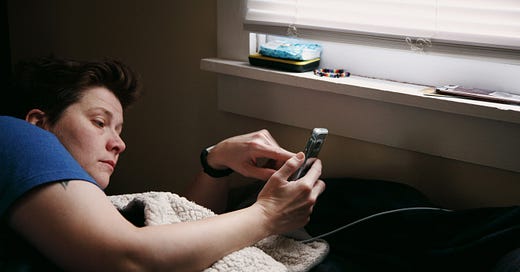The world is on fire, but your body still needs rest.
Not just sleep. Not just eight hours. But the kind of rest that requires safety—deep safety. The kind of safety that lets you stop performing, stop scanning the room for danger, stop holding onto the narrative that conscious life requires. But how can you sleep when the walls feel like they’re closing in?
The truth is, you probably can’t. Not fully. Not without clinging to something—anything—that feels stable. That’s what we do when the world feels unstable. We reach for what we know. What we can control. The same dinner order. The same playlist. The same scroll through the same feeds that make us feel connected for a few fleeting seconds.
It looks like laziness.
It feels like denial.
But really, it’s survival.
And bedtime is when it hits the hardest.
That’s when the performance ends, the lights go off, and all that’s left is your brain, your breath, and everything you couldn’t fix. Sleep becomes a battleground. Because to fall asleep, you have to let go. And to let go, you have to believe that, at least for a few hours, you’re safe.
So we create rituals. The same pillow. The same scent. The same voice on the other end of the line. They steady us when the world starts to slip. They’re signals to our nervous system: You can stop now. You’re safe enough to rest.
But what if you’re not?
What if the unease isn’t just in your head, but engineered?
What if someone benefits from your inability to relax?
Because that’s where this goes next…
This isn’t just about anxiety. It’s about control. It’s about profit. And the people making the most money in this country aren’t just solving problems—they’re manufacturing the conditions that make you feel unsafe in the first place.
Capitalism rewards solutions. But it also assumes there's always a problem to solve. And if you can’t find one, well—create one.
Sell the problem. Then sell the fix.
Flood the news with outrage. Then launch a wellness app.
Collapse the housing market. Then invest in tent cities.
Undermine teachers. Then launch an edtech startup.
Make people feel disconnected. Then sell “community” as a subscription.
This is disaster capitalism. And it's not new. The only difference is that now it lives in your pocket, follows you into your bedroom, and whispers in your ear while you try to fall asleep.
People sometimes think of billionaires as builders. But most of them aren’t building anything that improves life for the average person. They’re extracting from instability. They’re monetizing fear. They’re selling bottled water at the edge of the fire while quietly pouring gasoline behind the scenes.
And we’re exhausted. We’re overworked, underpaid, politically abandoned, and emotionally depleted. So, we retreat. Not out of cowardice, but out of necessity. We scroll. We order takeout. We check the same three apps. We cling to the things that make us feel okay for five minutes. Because those five minutes feel like all we have.
But here’s the thing: capitalism doesn’t want you to feel okay. Not really. Because peace doesn’t sell. Stability doesn’t scale. Rest doesn’t generate quarterly profits. So it keeps you in a loop—exhausted enough to comply, scared enough to buy, but just functional enough to keep the machine running.
And the people profiting from that loop?
They don’t live in your neighborhood. They’re not worried about rent. They’re not trying to fall asleep wondering if tomorrow’s headlines will be worse than today’s. They’re selling the pillows. They’re licensing the music. They’re buying the platforms and the therapists and the judges and the laws. They’re doing just fine.
Once you see the loop for what it is, you can start looking for real exits. You can build different rituals. Real community. Real safety. Real rest.
Maybe the most radical thing you can do in a collapsing world—before you fight, before you protest, before you organize—is to find one small place where you feel safe enough to fall asleep without fear.
And then help someone else do the same.
Because rested people think.
And thinking people organize.
And organized people change everything.







